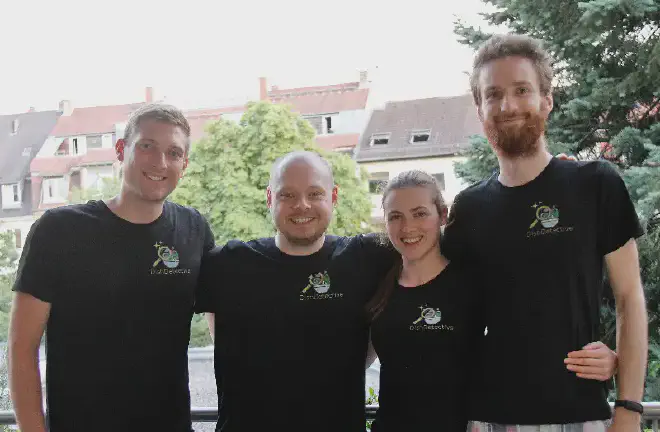Being a part-time founder
Table of Contents
Back in 2019, Verena, Robin and I did a practical course at the cv:hci lab at the Karlsruhe Institute of Technology (KIT). In comparison to lectures or seminars, a practical course is where you can get your hands dirty. During this course we’ve developed an AI algorithm that is the basis for the DishDetective app, which was released as Beta in August and which you can test now. After we’ve made the decision to turn our research project into a product, we immediately started preparing to found our startup. During these early days, we were able to win Tobias, who decided to give up his software engineering job in Munich and to join our team. Things got serious at the beginning of 2022 when we officially started operating as a company: Verena, Robin and Tobias work full-time on the project, while I contribute part-time. In this post I would like to give you an insight into my experiences as a part-time co-founder who successfully manages 2 jobs: being a co-founder of a startup and a full-time employee in a large company.

Work async #
In my opinion, a good balance between an asynchronous and a synchronous work pattern is the key to success. An asynchronous work pattern does not require all team members to work at the same time on something. However, for example, scheduling a video call means that you follow in this case a synchronous work pattern. If your collaboration contains too many synchronous work elements, you quickly become highly dependent on each other and you might lose velocity. In my situation, it is crucial that I can work independently at my own hours while still being able to make an important contribution to the startup. We are facing this situation a lot, as we are an early stage startup and, basically, have to figure out things as we go. To handle this situation successfully, we’ve established tools to help us disentangle the work flow. Communication via chat, the use of a Trello board for all tasks and a shared calendar make our work easier. These tools also ensure that each team member has a rough idea of what the other members are working on. This way we can solve most of the problems, and the advantages are immediately noticeable: easier overview, communication with the chance to look up something later on, and much less effort to coordinate. The things we still prefer to do synchronously are more complex issues like, strategy meetings and important discussions. An example of this synchronisation is our weekly team meeting, where team members get their time to share the most important things they have been working on. There we also set the next steps and plan the roadmap.
Time management #
An important factor for the success of your project is a good time management. Do you feel like you are short on time? It might be helpful to check for time killers. The average daily use of social media is about 2 hours and 27 minutes. That’s a lot of time you could be focusing on your startup instead. Of course, you should take time for yourself and relax, but differentiate between quality free time and mindlessly scrolling through social media and replace the bad parts. Personally, I use social media like twitter mostly to aggregate news from different pages into one feed. Having a dedicated 15 minutes time slot to check twice a day the social media apps, it works quite well to use the apps as a tool.
Idle time can be turned into productive time as well. If you are commuting with bus or tram, you can use this time to work on a presentation or to sketch some ideas. For example, when I’m travelling, I mainly use the time to catch up on what’s going on by reading my team members’ chat messages.
Work on issues where you can make a difference #
For you as a team, it is important to know which team member can and wants to contribute to a particular topic. If you work part-time, I think it is even more important that you work on issues where you have a big impact on. For example, when you need 50% less time for a specific task in comparison to another team member, your leverage is 2x. I use my limited time to solve problems in the areas where I have a lot of experience to maximise the contribution. At the moment I have the opportunity to take responsibility for our kubernetes cluster and some backend services - these are subjects that I love, and I am very familiar with. We don’t have fixed roles at DishDetective since we all come from a similar (computer science) background.
Summary #
As we are a young startup, things are still changing a lot. By working asynchronously and using tools that help us to communicate more efficiently, we are continuously improving our collaboration. In return, we can focus most of our time on working on the great tech behind DishDetective and not wasting too much energy on coordination.
Do you have thoughts and want to share your experience with tackling different jobs? Then feel free to reach out to us and discuss.
If you want to know more about what we’re doing at DishDetective, please, check out our website or LinkedIn page.